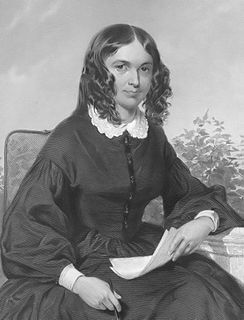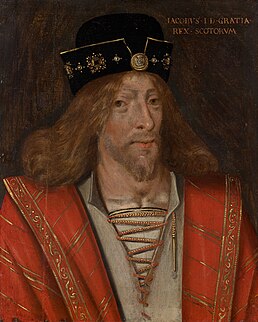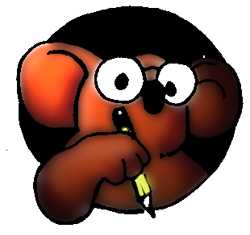
Elizabeth Barrett Browning was an English poet of the Victorian era, popular in Britain and the United States during her lifetime.
February 6 is the 37th day of the year in the Gregorian calendar. There are 328 days remaining until the end of the year.
John Brown most often refers to:

James I, the youngest of three sons, was born in Dunfermline Abbey to King Robert III and his wife Annabella Drummond. By the time he was eight, both of his elder brothers were dead—Robert had died in infancy but David, Duke of Rothesay, died suspiciously in Falkland Palace while being detained by his uncle, Robert, Duke of Albany. Although Albany was exonerated by parliament, fears for James's safety grew through the winter of 1405 – 1406 and plans were made to send him to France. In February 1406, James was accompanying nobles close to his father when they clashed with supporters of Archibald, 4th Earl of Douglas, forcing the prince to take refuge in the castle of the Bass Rock, a small islet in the Firth of Forth. He remained there until mid-March when he boarded a vessel bound for France, but on 22 March while off the English coast, pirates captured the ship and delivered James to Henry IV of England. The ailing Robert III died on 4 April and the 12-year-old James, now the uncrowned King of Scots, would not regain his freedom for another 18 years.

Robert II reigned as King of Scots from 1371 to his death as the first monarch of the House of Stewart. He was the son of Walter Stewart, 6th High Steward of Scotland and of Marjorie Bruce, daughter of the Scottish king Robert the Bruce by his first wife Isabella of Mar.

Robert Brown FRSE FRS FLS MWS was a Scottish botanist and palaeobotanist who made important contributions to botany largely through his pioneering use of the microscope. His contributions include one of the earliest detailed descriptions of the cell nucleus and cytoplasmic streaming; the observation of Brownian motion; early work on plant pollination and fertilisation, including being the first to recognise the fundamental difference between gymnosperms and angiosperms; and some of the earliest studies in palynology. He also made numerous contributions to plant taxonomy, including the erection of a number of plant families that are still accepted today; and numerous Australian plant genera and species, the fruit of his exploration of that continent with Matthew Flinders.

Murphy Brown is an American sitcom created by Diane English that premiered on November 14, 1988, on CBS. The series stars Candice Bergen as the eponymous Murphy Brown, a famous investigative journalist and news anchor for FYI, a fictional CBS television newsmagazine, and later for Murphy in the Morning, a cable morning news show.

Robert Wallace Forster, Jr. is an American actor, known for his roles as John Cassellis in Haskell Wexler's Medium Cool (1969), Lebanese terrorist Abdul Rafai in The Delta Force (1986), and Max Cherry in Quentin Tarantino's Jackie Brown (1997), for which he was nominated for the Academy Award for Best Supporting Actor.
James Brown (1933–2006) was an American recording artist and musician.
The New Zealand Socialist Party was founded in 1901, promoting the works of Karl Marx and Friedrich Engels. The group, despite being relatively moderate when compared with many other socialists, met with little tangible success, but it nevertheless had considerable impact on the development of New Zealand socialism. It later merged in 1913 with a faction of the United Labour Party to form the Social Democratic Party.

Little, Brown and Company is an American publisher founded in 1837 by Charles Coffin Little and his partner, James Brown, and for close to two centuries has published fiction and nonfiction by American authors. Early lists featured Little Women by Louisa May Alcott, Emily Dickinson's poetry, and Bartlett's Familiar Quotations. As of 2016, Little, Brown & Company is a division of the Hachette Book Group.
Bobby Brown is an American R&B singer.
Waris or Walsa is a Papuan language spoken by about 2,500 people around Wasengla, Amanab District, Sandaun Province, Papua New Guinea, as well as about 1,500 across the border in the Indonesian province of Papua.

English is a West Germanic language that was first spoken in early medieval England and eventually became a global lingua franca. Named after the Angles, one of the Germanic tribes that migrated to the area of Great Britain that would later take their name, England, both names ultimately deriving from the Anglia peninsula in the Baltic Sea. It is closely related to Frisian and Low Saxon, and its vocabulary has been significantly influenced by other Germanic languages, particularly Norse, and to a greater extent Latin and French.
What a Country! is an American sitcom that aired in syndication from September 27, 1986 to May 23, 1987. It was based on the 1977-1979 British sitcom Mind Your Language. The series was intended as somewhat of a showcase for comedian Yakov Smirnoff, whose catchphrase provided the show's title.
Robert Browne may refer to:
Christmas-Eve and Easter-Day, a Poem (1850) is, despite the title, often treated as two poems by Robert Browning, rather than as one poem in two parts. It was the first new work published by Robert Browning after his marriage to Elizabeth Barrett Browning and their departure for Italy, and is widely considered to show the influence of his wife's religious beliefs. "Christmas-Eve" is an account of a vision in which the narrator is taken to a Nonconformist church, to St. Peter's in Rome, to a Göttingen lecture theatre where a practitioner of the Higher criticism is discoursing on the Christian myth, and back to the Nonconformist church. In "Easter-Day" a Christian and a sceptic debate the nature of faith. Christmas-Eve and Easter-Day gives valuable clues to the religious opinions of Browning himself, as opposed to those of his characters, but, as his wife warned a correspondent, "Certainly the poem does not represent his own permanent state of mind, which was what I meant when I told you it was dramatic."









